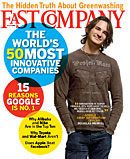When In Doubt, Do Something
 The most recent issue of Fast Company celebrates Google as the world's most innovative company. Inside are scads of interviews with folks who work there, each telling their tale not only about why it's a great place to work, but how it was recognized as being a place of creativity and ingenuity.
The most recent issue of Fast Company celebrates Google as the world's most innovative company. Inside are scads of interviews with folks who work there, each telling their tale not only about why it's a great place to work, but how it was recognized as being a place of creativity and ingenuity.Of particular interest to me was the reasoning on David Glazer, an engineering director. He comments:
We started running a bunch of experiments. We set an operational tempo: When in doubt, do something. If you have two paths and you're not sure which is right, take the fastest path. What's true in physics about motion is true when you're creating a product. It's easier to keep moving and change course than when you're sitting and thinking and thinking.No wonder Google's stock price soars and its functions continue to get better. No wonder it could very well soon take over the world.
When you have a lot of talented people and allow them to unleash those talents in order to create anything, you’ll be surprised at what happens. And you'll ride this big wave of creative momentum all the way to the bank.
If you're losing talented workers, if you can't connect with a younger set, if it seems like your competition is bypassing you by leaps and bounds, look at your innovation policy.
Google allows its employees to spend 20% of their time working on whatever they want. Such a policy means that brilliant products and ideas stay in-house. Even though folks leave Google to start their own company, many stay put and are handsomely rewarded for their creative outbursts.
Many folks leave awful jobs in order to have the freedom to simply do what they're good at. It's a shame that so few workplaces provide talented people with the appropriate freedom and resources to stretch themselves and the company's own idea of what is possible.
I can't help but wonder in woeful agony how many great ideas are simply dying in people's minds because the higher ups or the current processes in place at any given business are ones that embody the opposite idea from the one that Glazer champions.
Ask around. If your place of work has a "When in doubt, sit on your hands, stay put and shut up" policy, then chances are, they'll very soon be having a Chapter 11 policy.



Comments (4)
8:37 AM
I've read the article too as I am an actual subscriber to a physical magazine (even though that is so 1998). This past weekend I had the opportunity to sit next to Kevin Marks of Google at a conference in Miami. We were listening to another Google engineer lead a small panel on the topic of brainstorming. The speaker asked the crowd what to brainstorm about. One gentleman said, "Save the World" Within 5 minutes the Googler had assembled a plan by talking out loud and making suggestions. These guys "Do" and worry about the how as it comes.
Gen-Y has this spirit and if corporations and companies cannot keep up, we will go on our own path and "do"
8:54 AM
Right on. I've heard it's always easier to correct your path once you've started than sit and wait and never get going in the first place.
11:11 AM
I absolutely agree, and this is a mindset that's not exclusive to organisations, but can manifest in peoples personal lives too.
A lot of people fall into the trap of talking about stuff rather than actually doing it. A lot of people buy themselves time and stall, giving more fuel to their doubts and giving them more room to stay right where they are.
We all have a part of ourselves that, if left unchecked to do what it wants, will say 'When in doubt, sit on your hands, stay put and shut up.'
Chances are, if people do that in their personal lives they'll take the same approach into the workplace too.
12:08 PM
Well put, Steve.
I agree that sometimes, the initiative to act can't be taught - it may just be a fundamental part of who a person is.
Post a Comment